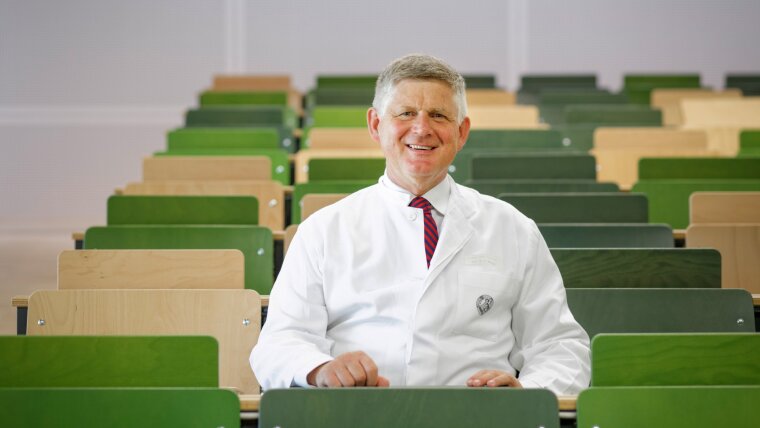
- Research
- Awards and Personnel
Published: | By: Uta von der Gönna
Chronic myeloid leukaemia (CML) is the second most common form of chronic leukaemia, affecting around 1,200 people in Germany every year. This disease of the haematopoietic system, caused by an acquired genetic disorder, leads to a sharp increase in white blood cells. New active substances, known as tyrosine kinase inhibitors, specifically inhibit the activity of the mutated protein that triggers continued division in the leukaemia cells. These active substances have fundamentally improved the treatment of CML, which can only be cured by stem cell transplantation.
The molecular mechanisms underlying the development of haematological diseases and the design and management of clinical trials for new treatment concepts are the main areas of research for Jena-based haematologist and oncologist Prof. Dr Andreas Hochhaus. He led the ASC4FIRST study, planned in collaboration with industry partners, to test the new tyrosine kinase inhibitor Asciminib. This drug has a modified molecular mechanism of action and is initially only approved for cases in which other therapies have not been sufficiently effective or have lost their effect due to the development of resistance.
Worldwide approval of a new active ingredient
In 111 study centres in 29 countries, over 400 CML patients were treated with either the standard therapy or with the new active substance. It was found that the new active substance represses leukaemia significantly faster and more effectively, with significantly fewer undesirable side effects. The study thus provides the basis for the worldwide approval of Asciminib as a first-choice active substance for CML.
For over 20 years, Andreas Hochhaus has been conducting research in international study groups and translational projects to gain a better understanding of the mechanisms of the disease and to improve the treatment of CML. For this clinical research work in the interest of patients, Thuringia's Minister of Science and Education, Christian Tischner, today awarded Professor Andreas Hochhaus the Thuringian Research Prize 2025 in the »applied research« category. He shares the prize, worth €25,000, with a research team from Nordhausen University of Applied Sciences, which has developed an innovative concept for sewage sludge treatment.
In his acceptance speech, Hochhaus emphasized the importance of clinical trials at university hospitals as a gateway to innovation for all those affected: »Clinical research in the context of knowledge-generating care is a core task of university medicine. I regard this award as a tribute for my entire study team in Jena and the cooperating institutions.«
About the person
After completing his studies and specialist training in Leipzig and Erfurt, Andreas Hochhaus worked at the University Hospital Mannheim and was awarded a José Carreras endowed professorship for leukaemia research at the Heidelberg University. In 2009, the internist returned to Thuringia as Professor of Haematology and Medical Oncology at the University Hospital in Jena.
The Director of the Department of Internal Medicine II is the spokesperson for the University TumorCentrum and coordinates the German CML Alliance which has members from the fields of medicine, nursing and research, laboratory diagnostics and patient advocacy, and serves as a platform for multi-centre studies. As Dean of Research, Prof. Hochhaus helped shape the development of the Faculty of Medicine for over ten years. Since 2023, he has been co-director of the Comprehensive Cancer Center Central Germany, which German Cancer Aid has established as a leading oncology centre at the university hospitals of Jena and Leipzig, as well as managing directir of the German Society for Haematology and Medical Oncology.
Contact:
07747 Jena Google Maps site planExternal link